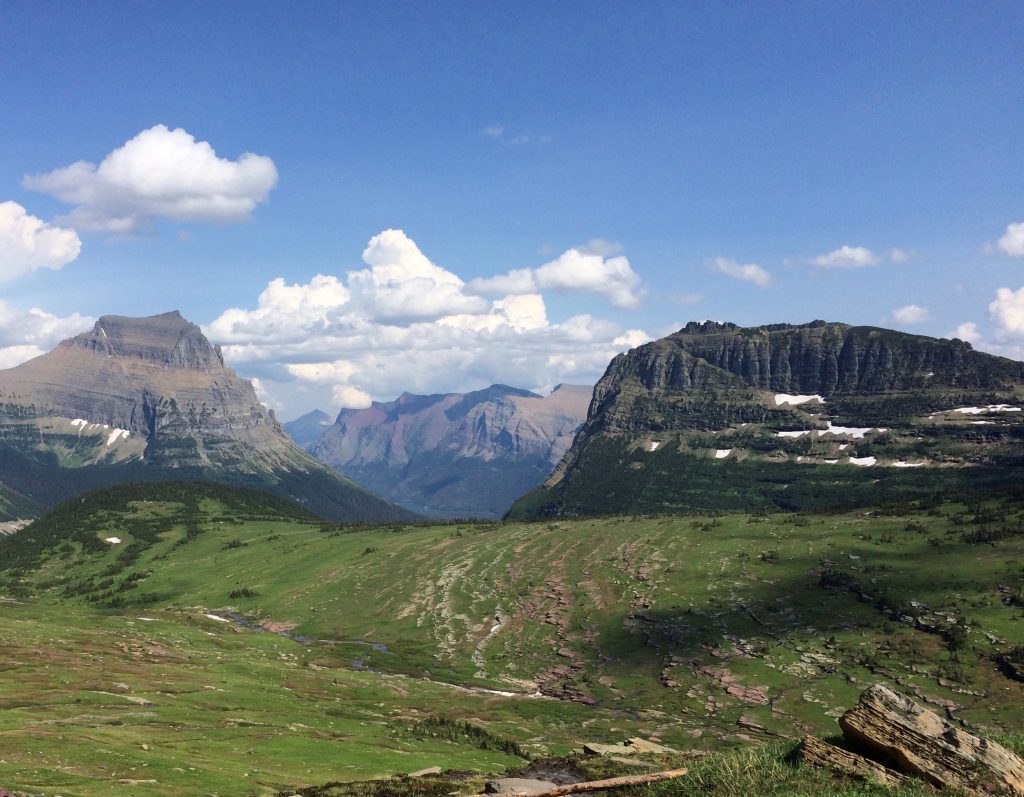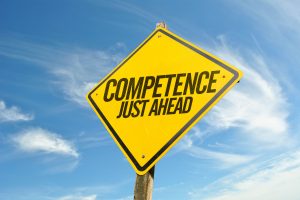hiking scared
Several years ago, I visited Glacier National Park. It was a wonderful week of reading, journaling, and hours hiking through stunning scenery. I went for solitude and reflection. But it was the experience of day-hiking that produced a major insight about myself: I walk through life looking over my shoulder.
The insight came because I hiked the whole week literally looking over my shoulder. Glacier National Park has the highest population of grizzly bears of any U.S. national park. So I walked those impressive trails with one eye on the beauty, one eye on my feet, and one eye scanning for grizzlies. Yes, that makes for three eyes, but the vigilance felt like that.

Because I read the park information and stories online, I knew the danger before I arrived and I took precautions. The first thing I did was buy bear spray. I attached a cord and slid it into an outside daypack pocket and practiced drawing it like a gunslinger. Second, I hiked on popular trails and tagged along with others when I could. I clapped my hands and whistled when I hiked. And, of course, I adopted a decidedly non-tasty-looking posture. Still, I felt the anxiety more than I anticipated.
Most visitors never stray more than a half mile from the road. But several of my treks went much deeper than that, so I would be alone for long stretches. It was what I wanted, but it made me nervous. And so I scanned, listened, and constantly looked over my shoulder. Of course, this was both the wise thing to do and the cost of hiking alone.
But it also felt familiar – weirdly familiar. That was my insight, you see. This kind of ‘vigilance’ wasn’t entirely new. I walk through daily life scanning for danger, too. Not for bears, but for ‘unbearable situations.’ You know the situations I mean: where I might feel embarrassed, put on the spot, hurt, asked to do something uncomfortable or inconvenient. These ‘bears’ are everywhere. At any moment, a situation might thunder out from the undergrowth and require me to be brave or vulnerable. So I stay alert and avoid confrontation. I’ve gotten quite good at it. So good that I hardly notice my near-continuous guardedness.
Stunning vistas are all around me, but I am looking behind bushes. Interesting and dear people are encountered all along the way, but I am listening for the rustle of hidden motives. If something does grunt and threaten me, I pull the cord and spray the situation with the orange mist of defensiveness or avoidance. I am busy and alert. Sometimes I walk through a whole morning of amazing situational peaks and valleys, but instead of experiencing them, I merely survive them.
Yes, the feeling of walking scared was familiar to me. It is because I walk alone. I don’t particularly mean that I am not in a group; I mean that I live as if everything is dependent on me. I rely on my eyes alone, my quick reflexes alone, my choice of safer trails. There are a couple of obvious problems with this.
First of all, I am not enough. All my scanning, all precautions aren’t enough for even a small life-grizzly. To be safe in this life and to be safe in death, I will need something much more than an aerosol can. I need God walking with me.
And second, constantly scanning for danger isn’t living. You will miss all the scenery. You will avoid all the people. Walk scared and you won’t experience the heart-pounding heights of God-given courage. Walk scared and you won’t lean into the bracing wind of vulnerability.
You have to walk in faith to experience unspoiled beauty and wild love.
 Roger Edwards joined The Barnabas Center in 1991. He works with both with individuals and couples, helping people confess their need and embrace their available choices to lead healthier lives. Roger also teaches and leads discussion groups and retreats applying the Gospel to everyday life. He is a licensed professional counselor (LPC), holds a master’s degree in biblical counseling from Grace Theological Seminary in Indiana and earned a bachelor’s degree in engineering from the University of North Carolina at Charlotte. He is married to Jean and they have seven children and nine grandchildren.
Roger Edwards joined The Barnabas Center in 1991. He works with both with individuals and couples, helping people confess their need and embrace their available choices to lead healthier lives. Roger also teaches and leads discussion groups and retreats applying the Gospel to everyday life. He is a licensed professional counselor (LPC), holds a master’s degree in biblical counseling from Grace Theological Seminary in Indiana and earned a bachelor’s degree in engineering from the University of North Carolina at Charlotte. He is married to Jean and they have seven children and nine grandchildren.




